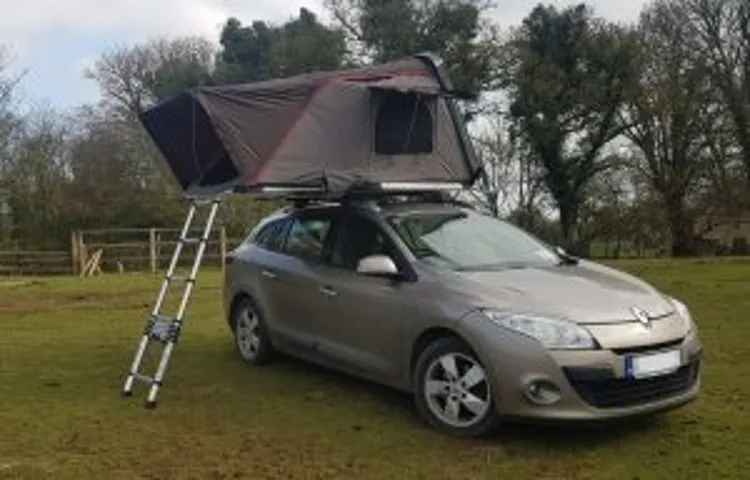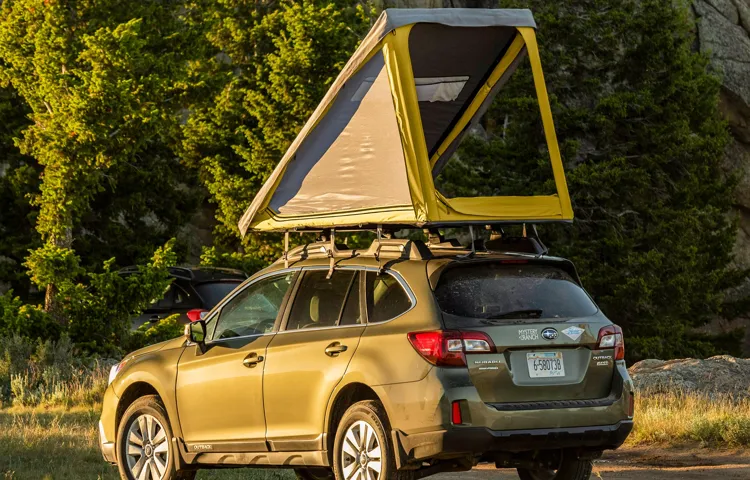Thinking about taking your car on a camping adventure? One of the coolest and most convenient ways to do so is by adding a roof top tent to your vehicle. But before you start envisioning yourself sleeping under the stars, it’s important to determine whether your car can actually support a roof top tent. After all, the last thing you want is for your car’s roof to cave in during the middle of the night! Luckily, assessing whether your car can handle the weight of a roof top tent is not as complicated as it may seem.
While the answer may vary depending on the make and model of your vehicle, most cars are capable of supporting the additional load. In fact, modern cars are designed with roof racks that can withstand a certain amount of weight, making them compatible with roof top tents. To determine if your car can support a roof top tent, you should consider a few factors.
First and foremost, check the weight limit specified by the manufacturer for your car’s roof rack system. This information can usually be found in your car’s manual or by doing a quick online search. If the weight limit is sufficient to accommodate the weight of a roof top tent (typically around 150-200 pounds), then you’re good to go! In addition to the weight limit, it’s important to consider the overall size and shape of your car’s roof.
Roof top tents come in various sizes and configurations, so you’ll need to make sure that your car’s roof can accommodate the specific dimensions of the tent you choose. Keep in mind that some roof top tents may require additional roof rack attachments or modifications to ensure a secure fit. Once you’ve determined that your car can support a roof top tent, you’ll be ready to embark on your camping adventure with ease and comfort.
No more worrying about finding a level spot to pitch your tent or dealing with pesky bugs crawling into your sleeping bag. With a roof top tent, you can simply park your car, pop up the tent, and enjoy a cozy night’s sleep above the ground. So, if you’re a camping enthusiast looking to take your outdoor adventures to new heights, consider adding a roof top tent to your car.
As long as your vehicle meets the necessary requirements, you’ll be well on your way to experiencing the thrill of sleeping under the stars, all while enjoying the convenience and mobility of your own car. Happy camping!
Table of Contents
Understanding Roof Top Tents
If you’re wondering whether your car can support a roof top tent, the answer depends on a few factors. First, you’ll need to consider the weight limit of your car’s roof rack, as well as the weight of the tent itself. Roof top tents can range in weight from around 100 pounds to over 200 pounds, so it’s important to ensure that your car’s roof rack is rated for that amount.
Additionally, you’ll want to consider the overall weight distribution on your car. A roof top tent adds significant weight to the top of your car, which can affect the handling and stability. It’s always a good idea to consult your car’s owner’s manual or reach out to the manufacturer to determine the specific weight limits and recommendations for your vehicle.
What is a roof top tent?
A roof top tent is a type of portable tent that is designed to be set up on top of a car or truck. It is a convenient and efficient way to camp, as it eliminates the need for a traditional tent and allows you to sleep comfortably off the ground. Roof top tents are typically made from durable materials that can withstand various weather conditions and provide protection from the elements.
They are also equipped with a sturdy base and a ladder for easy access. One of the biggest advantages of using a roof top tent is that it allows you to camp in places where traditional tents cannot be set up, such as on rocky terrain or in areas where the ground is wet or muddy. Additionally, roof top tents are easy to set up and take down, which makes them ideal for both weekend getaways and longer camping trips.
So, if you love the great outdoors and are looking for a new way to experience camping, a roof top tent might be just what you need.

Advantages of a roof top tent
roof top tent, advantages of roof top tents. Hey there! Have you ever considered camping in a roof top tent? They may not be as common as traditional ground tents, but they definitely come with some amazing advantages. One of the biggest perks of a roof top tent is the ability to sleep comfortably above the ground.
No more worrying about uneven terrain or pesky rocks digging into your back. With a roof top tent, you can enjoy a flat and comfortable sleeping space, no matter where you choose to camp. Another great advantage of a roof top tent is the ease of setup and takedown.
Unlike ground tents that can take forever to set up, roof top tents are incredibly quick and simple to install. Most roof top tents have a built-in mechanism that allows you to easily pop them open and secure them to your vehicle’s roof. This means you can spend less time setting up camp and more time enjoying the great outdoors.
Roof top tents also provide excellent protection from the elements. With their elevated design, you won’t have to worry about rainwater seeping into your sleeping space or waking up to a flooded tent. Additionally, roof top tents offer great insulation, keeping you warm in cold weather and cool in hot weather.
Say goodbye to uncomfortable nights spent shivering or sweating in your tent. One last advantage of roof top tents is the added security they provide. Since they are mounted on top of your vehicle, you can sleep soundly knowing that you are safe from critters and other wildlife that may be roaming around at ground level.
Plus, the elevated position of the tent can give you a better view of your surroundings, allowing you to spot any potential dangers or intruders. So, if you’re looking for a convenient, comfortable, and secure way to camp, a roof top tent might just be the perfect choice for you. No more struggling with traditional tents or worrying about the conditions on the ground.
Factors to Consider Before Installing a Roof Top Tent
Before installing a roof top tent on your car, there are a few factors you should consider to ensure that your vehicle can support the added weight. First, you’ll want to check the weight limit of your car’s roof rack or roof bars. Different vehicles have different weight capacities, so it’s important to know if your car can handle the additional load.
Additionally, you’ll need to consider the overall weight distribution of your car. Adding a roof top tent can affect the balance and stability of your vehicle, so it’s crucial to ensure that the weight is properly distributed to avoid any handling issues. It’s also important to consider the aerodynamics of your car.
The added height and bulk of a roof top tent can create wind resistance, which may impact your car’s fuel efficiency and handling at high speeds. Lastly, you should assess the structural integrity of your car’s roof. Some vehicles are designed to support the weight of a roof top tent, while others may require additional reinforcement.
It’s always a good idea to consult your car’s manufacturer or a professional installer to ensure that your vehicle is suitable for a roof top tent.
Weight capacity of your car
“weight capacity of your car” Installing a roof top tent can be a game-changer for your outdoor adventures, but before you rush out and buy one, there are a few factors you need to consider. One of the most important factors is the weight capacity of your car. Every vehicle has a maximum weight that it can safely carry, and exceeding this limit can be dangerous and potentially damage your car.
So, how do you determine the weight capacity of your car? Well, the easiest way is to check the owner’s manual or consult with the manufacturer. They will have all the information you need to know about the maximum weight limits for your specific make and model. It’s important to remember that the weight capacity includes not only the weight of the roof top tent but also any additional gear or passengers you may be carrying.
So, before you hit the road with your new roof top tent, make sure you double-check the weight capacity of your car to ensure a safe and enjoyable journey.
Roof rack compatibility
roof rack compatibility, factors to consider before installing a roof top tent When it comes to installing a roof top tent, it’s important to consider the compatibility of your roof rack. Not all roof racks are designed to support the weight and size of a roof top tent, so it’s crucial to do your research before making a purchase. One of the main factors to consider is the load capacity of your roof rack.
Roof top tents can be quite heavy, so you want to make sure your roof rack can handle the added weight. Additionally, you’ll want to check the dimensions of your roof rack to ensure it is wide and long enough to accommodate the tent. Another important factor is the attachment method of the roof top tent.
Some tents require specific crossbars or mounting systems, so it’s essential to make sure your roof rack is compatible with the tent you have in mind. By considering these factors before installing a roof top tent, you can ensure a safe and secure camping experience.
Overall vehicle height
roof top tent, vehicle height One important factor to consider before installing a roof top tent is the overall height of your vehicle. Ro Top tents are designed to be mounted on the roof of your vehicle, so it’s crucial to make sure that there is enough clearance when driving under low-hanging obstacles like tree branches or parking garages. The height of your vehicle will determine how much space is needed between the top of the roof and any potential obstructions.
The last thing you want is to damage your roof top tent or your vehicle because it’s too tall for certain areas. So, before you install a roof top tent, be sure to measure the overall height of your vehicle and consider the potential restrictions you may encounter during your travels.
Aerodynamics and wind resistance
roof top tent. When considering installing a roof top tent on your vehicle, there are several factors to take into account, one of them being aerodynamics and wind resistance. Roof top tents can create additional drag, which can affect the overall aerodynamic performance of your vehicle.
This is because roof top tents are not streamlined like the rest of the vehicle, and they can catch the wind, leading to increased resistance. The added drag can result in decreased fuel efficiency and increased wind noise while driving. To minimize the impact of aerodynamics and wind resistance, it is important to choose a roof top tent that is designed with aerodynamics in mind.
Look for features such as low-profile designs, streamlined shapes, and aerodynamic materials. These features can help reduce the amount of drag and improve the overall performance of your vehicle. Additionally, consider the placement of the roof top tent on your vehicle.
Mounting it towards the front of the roof may help to reduce wind resistance compared to mounting it towards the back. It’s also a good idea to consider the weight and height of the roof top tent, as taller and heavier tents can create more wind resistance. By taking these factors into consideration, you can ensure that you install a roof top tent that minimizes the impact on your vehicle’s aerodynamics and wind resistance.
Determining if Your Car Can Support a Roof Top Tent
If you’re considering adding a roof top tent to your car, the first step is to determine if your vehicle can support the weight. Not all cars are able to handle the additional load of a roof top tent, so it’s important to do your research before making a purchase. The most crucial factor to consider is the roof rack or roof rails on your car.
These are essential for securely attaching the tent to your vehicle. The weight capacity of your roof rack or rails should be clearly stated by the manufacturer. Typically, a car with a roof rack can support the weight of a roof top tent, but it’s always best to double-check the specifications.
Additionally, you should consider the overall weight of your car. If your car is already close to its maximum weight capacity, adding a roof top tent may put too much strain on the vehicle. It’s also worth considering the design and weight distribution of your car.
Some vehicles have weaker roofs or are more top-heavy, which may not be suitable for a roof top tent. Ultimately, it’s essential to consult your vehicle’s manual or contact the manufacturer to ensure that your car can safely support a roof top tent.
Checking the roof weight capacity
roof weight capacity, car, support, roof top tent, car’s roof, weight limit
Evaluating the strength of your roof rack
roof rack, car, support, roof top tent
Measuring the overall vehicle height
measuring vehicle height, roof top tent, car compatibility
Popular Car Models That Support Roof Top Tents
If you’re wondering, “Can my car support a roof top tent?” the answer depends on the make and model of your vehicle. Some cars are better suited for rooftop tent installations than others. Popular car models that can support roof top tents include SUVs like the Jeep Wrangler, Toyota 4Runner, and Subaru Outback.
These vehicles have a sturdy roof rack system and a high weight capacity, making them ideal for carrying heavy loads like a roof top tent. Additionally, trucks like the Ford F-150 and Toyota Tacoma are also great options for rooftop tent camping. Their large truck beds provide ample space for a tent, while their rugged build allows for off-road adventures.
So, if you own one of these car models, you can definitely enjoy the convenience and comfort of a roof top tent on your next camping trip.
Car models with high weight capacity
roof top tents, weight capacity, popular car models
Car models with compatible roof racks
roof top tents, car models, compatible roof racks
Car models with sufficient vehicle height
Ready to hit the road and explore the great outdoors? If you’re a camping enthusiast and love the idea of sleeping under the stars, then a roof top tent might be just the thing for you. But before you invest in one, it’s important to make sure that your car can support it. Luckily, there are plenty of popular car models that have sufficient vehicle height to accommodate a roof top tent.
These car models include SUVs like the Toyota 4Runner, Subaru Outback, and Jeep Wrangler, as well as trucks like the Ford F-150 and Chevrolet Colorado. These vehicles not only have the height needed for a roof top tent, but they also have the stability and durability to handle the extra weight. So whether you’re planning a weekend camping trip or a cross-country adventure, you can rest easy knowing that your car is up to the task.
Conclusion
In the grand debate of whether or not your car can handle the awesomeness of a rooftop tent, the conclusion is clear: it all comes down to capability and creativity. If you drive a tiny smart car, well, you might want to rethink your outdoor ambitions. But if you’re behind the wheel of a rugged SUV or a sturdy truck, the rooftop tent world is your oyster.
Think of it this way: a rooftop tent is like the cherry on top of your outdoor adventure sundae. It’s the ultimate upgrade for any camping enthusiast who wants to elevate their camping game (quite literally). But before you dive headfirst into the world of rooftop tents, do your homework and consider your car’s weight capacity, roof shape, and overall structural integrity.
Just like a relationship, the compatibility between your car and a rooftop tent is crucial. It’s all about finding the perfect match. So, check your car’s manual, consult with experts, and maybe even take a test drive with a rooftop tent to see how it handles before committing to the ultimate camping upgrade.
So, whether you’re exploring the great outdoors or just looking for a unique and stylish way to camp, a rooftop tent can be a game-changer. It’s like having a portable treehouse or a secret hideaway on top of your car. Plus, it’s bound to make your camping buddies green with envy.
So, go forth, adventurous souls, and embrace the rooftop tent life. Just make sure your car is up to the task, and you’ll be living your best camping life in no time. Happy camping, everyone, and remember: the sky’s the limit (literally)!”
FAQs
Can my car support the weight of a rooftop tent?
The weight capacity of a car’s roof is determined by the manufacturer. Check your car’s manual or contact the manufacturer to find out if it can support a rooftop tent.
What are the factors to consider when determining if my car can support a rooftop tent?
Some factors to consider include the weight capacity of your car’s roof, the type of mounting system required for the rooftop tent, and any additional modifications that may be needed to ensure proper support.
Can I install a rooftop tent on any type of car?
While many cars can support rooftop tents, it is important to check the weight capacity and roof structure of your specific car model. Some smaller or compact cars may not have the necessary strength to safely accommodate a rooftop tent.
How can I determine the weight capacity of my car’s roof?
The weight capacity of your car’s roof can usually be found in the owner’s manual or by contacting the car manufacturer. It is important to stay within the recommended weight capacity to ensure your safety and prevent damage to your car.
Are there specific rooftop tents designed for certain car models?
Yes, some rooftop tents are designed to fit specific car models or have compatibility with certain roof racks. It is important to check with the manufacturer or a professional retailer to ensure proper fitment for your specific car.
Can I use a rooftop tent on a car with a sunroof?
It depends on the size and design of the sunroof. Some rooftop tents may interfere with the operation or clearance of a sunroof. Consult the rooftop tent manufacturer or a professional retailer to determine if it is compatible with your sunroof.
Do I need to reinforce my car’s roof to support a rooftop tent?
In some cases, reinforcing the roof may be necessary to safely support a rooftop tent. This typically involves adding additional support brackets or modifications. It is best to consult with a professional installer or the rooftop tent manufacturer for guidance on reinforcement requirements.



